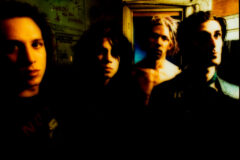Apocalypse: A Tour Documentary, a film directed by Hanly Banks that traces two weeks with doom-folk songwriter Bill Callahan, premiered in New York at the Lincoln Center’s Howard Gilman Theater on Saturday, July 27. The theater brimmed with good-natured Callahan superfans. Like the audiences depicted in the film, documenting his 2011 Apocalypse tour, the audience at the screening shared a collective reverence. For many, it was the closest they had been to a Callahan live performance.
The film is perhaps the most complete portrait of Callahan that exists, as the Austin native is infamously difficult to interview. Yet it further amplifies the Callahan mystery — curious hopefuls prepare to be disappointed, as Apocalypse doesn’t shed any more on his character than a handful of fragmented quotes. The only mention of his beginnings is when he remarks: “I started playing music when I was 20, and time stopped for me then in a good way.”
Periodically in the film, Callahan’s leathery voiceover corresponds with a series of images, from goat farms in Bastrop, Texas to mountains peaking through the van’s windows. “I write about transport, because transport is about movement,” he claims at one point in the film. “And movement is life.” Fittingly Apocalypse refuses to follow a linear narrative. It traces the 47-year-old songwriter’s journey through highways, live performances, and the quiet moments in between, like crackling family film reels unearthed from an attic. It’s less a movie, and more a series of time-lapsed fragments strung together.
Much like he winces under the spotlight at his sold-out performances, there’s a sense that Callahan doesn’t enjoy speaking about himself. “Onstage I feel exposed,” he murmurs at one point. “But live is the realest me that there is.” In turn, Callahan’s emotive live performances compose the majority of the film. The camerawork balances the intimacy of these moments without ever being intrusive. You see Callahan tasting the words as he sings them into the microphone, yet the only clue as to what he’s thinking is through an arched eyebrow or a gristly turn of phrase.
Questions were brief and respectful during a Q&A with Banks. When asked about Callahan’s demeanor off-camera, Banks simply read a message from Callahan to the audience that explained his wishes to be present that afternoon with the community. When Banks read Callahan’s message, it echoed one of his final quotes in the film. “Back then [when I started recording] it was about the self, about a singular being,” he admits. “Now it still is, but now the person is in the midst of a group, a society they share things with.” Banks’ masterful film is maybe Callahan’s best chance to reach them.





